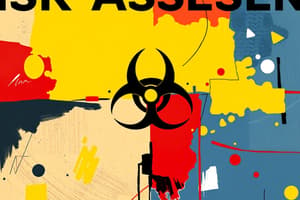Podcast
Questions and Answers
Which element of Process Safety Management (PSM) focuses on involving employees in decision-making processes?
Which element of Process Safety Management (PSM) focuses on involving employees in decision-making processes?
- Safety Audits
- Management of Change
- Incident Investigation
- Employee Participation (correct)
What does the abbreviation GHS stand for in hazardous materials management?
What does the abbreviation GHS stand for in hazardous materials management?
- Global Handling System
- Global Hazard Standards
- Globally Harmonized System (correct)
- General Health Standards
Which of the following is NOT a method of waste disposal mentioned in hazardous materials management?
Which of the following is NOT a method of waste disposal mentioned in hazardous materials management?
- Recycling
- Aeration (correct)
- Landfills
- Incineration
What type of human error involves misjudging a situation or using incorrect information?
What type of human error involves misjudging a situation or using incorrect information?
Which of these factors is categorized under Human Performance related to cognitive issues?
Which of these factors is categorized under Human Performance related to cognitive issues?
Which regulatory compliance standard is associated with the disposal of hazardous waste?
Which regulatory compliance standard is associated with the disposal of hazardous waste?
In the context of emergency planning and response, which example is NOT included in the typical scenarios addressed?
In the context of emergency planning and response, which example is NOT included in the typical scenarios addressed?
Which of the following is NOT a focus area of Hazardous Materials Management?
Which of the following is NOT a focus area of Hazardous Materials Management?
Which of the following describes a slip in the context of human error classification?
Which of the following describes a slip in the context of human error classification?
What is the main purpose of Management of Change (MOC) within Process Safety Management?
What is the main purpose of Management of Change (MOC) within Process Safety Management?
Flashcards
Employee Participation in PSM
Employee Participation in PSM
Involving workers in safety decisions, providing feedback, and offering training.
Process Hazard Analysis (PHA)
Process Hazard Analysis (PHA)
A systematic method for identifying potential hazards and assessing risks. Examples include HAZOP and FMEA.
Operating Procedures in PSM
Operating Procedures in PSM
Standardized procedures for operating equipment, responding to emergencies, and maintaining systems.
Mechanical Integrity in PSM
Mechanical Integrity in PSM
Signup and view all the flashcards
Management of Change (MOC)
Management of Change (MOC)
Signup and view all the flashcards
Pre-Startup Safety Reviews
Pre-Startup Safety Reviews
Signup and view all the flashcards
Safety Audits in PSM
Safety Audits in PSM
Signup and view all the flashcards
Incident Investigation in PSM
Incident Investigation in PSM
Signup and view all the flashcards
Emergency Planning and Response in PSM
Emergency Planning and Response in PSM
Signup and view all the flashcards
Compliance with Standards & Regulations in PSM
Compliance with Standards & Regulations in PSM
Signup and view all the flashcards
Study Notes
Advanced Safety Concepts - PSM
- Key Elements of PSM:
- Employee participation in decision-making, feedback, and training
- Process Hazard Analysis (e.g., HAZOP, FMEA)
- Operating procedures (SOPs), emergency responses, and maintenance tasks
- Training on SOPs, emergency responses, and equipment handling
- Mechanical integrity (pressure vessels, pipelines, pumps)
- Management of Change (MOC) processes
- Safety audits
- Incident investigations
- Emergency planning and response (e.g., gas releases, fires, explosions, chemical spills)
- Compliance with standards and regulations
- Hazardous Materials Management:
- Identification and classification of hazardous materials
- Properties of hazardous materials (flammability, corrosivity, reactivity, toxicity)
- Classification and labeling of chemicals (e.g., SDS, GHS, HCS)
- Globally Harmonized System (GHS) and Hazard Communication Standard (HCS)
- Storage and labeling requirements
- Handling and use training (COSHH)
- Personal Protective Equipment (PPE) requirements
- Transportation and shipping regulations (DOT, IATA, IMDG)
- Disposal and waste management (RCRA)
- Incineration, landfills, and recycling
- Regulatory compliance (OSHA, EPA, DOT)
- Registration, Evaluation, Authorization, and Restriction of Chemicals (REACH)
- Emergency Preparedness Response (EPR)
- Training and awareness programs
- Monitoring and record keeping
Human Performance
- Human Error:
- Classification of human errors: slips, mistakes, lapses
- Cognitive factors: attention, memory, decision-making, situational awareness
- Physical and ergonomic factors
- Work environment and organizational culture
- Training and competency
- Human performance tools (e.g., behavioral safety audits, performance feedback, checklists, error reporting)
- Fatigue management
- Team performance and communication
- Strict Liability Coverage:
- Insured party liable for harm (to others) caused by their actions or products, regardless of fault
- Product Liability Coverage:
- Covers costs associated with product-related insurance claims
- General Liability Insurance (e.g., errors and omissions)
- Professional Liability Insurance (errors and omissions)
- Product Liability Insurance
- Automobile Liability Insurance
- Workers' Compensation Liability Insurance
Studying That Suits You
Use AI to generate personalized quizzes and flashcards to suit your learning preferences.




